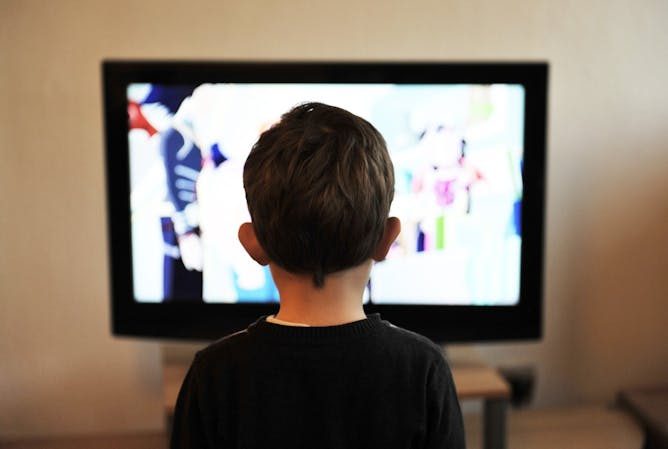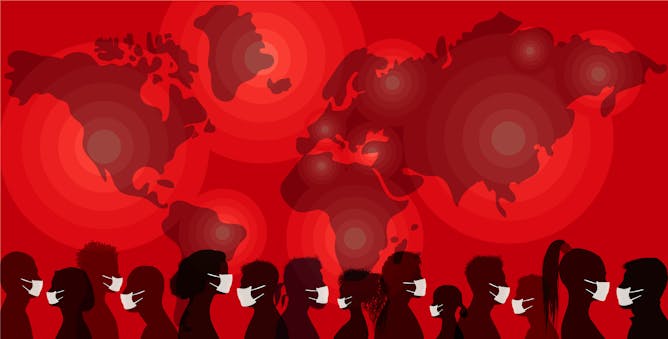|
With schools, daycares and workplaces closed, social distancing has put many parents in the situation of trying to work from home while also looking after children, with no options for playdates or excursions. You may be tempted to park the kids in front of a device or TV screen for long enough to get some emails written or do a video conference. You may also be worried that kids might be getting more screen time than is recommended.
That's understandable, say University of Calgary child psychologists and screen time researchers Brae Anne McArthur and Sheri Madigan. Today in The Conversation Canada, our authors walk parents through five ways to manage kids’ device use, including the types of screen time that can actually benefit kids.
Also today:
Regards,
|

Screen time can benefit children over age two if it’s the right kinds of programming.
(Vidmir Raic/Pixabay)
Brae Anne McArthur, University of Calgary; Sheri Madigan, University of Calgary
With parents trying to work from home while schools and daycare services are closed, some children may get more screen time than usual during COVID-19 social distancing.
|

A student lights the Olympic Flame during a ‘Flame of Recovery’ ceremony in Japan held the day after the decision was made to postpone the Tokyo Olympics because of the coronavirus pandemic.
AP Photo/Eugene Hoshiko
Bruce Kidd, University of Toronto
An athlete who competed in the 1964 Tokyo Olympics says when the rescheduled Olympics take place, the Games can help rebuild societies in a humanitarian way through the spirit of Olympism.
|

Few people stroll the Naviglio Grande canal, one of the favorite spots for night life in Milan, Italy, March 10, 2020, when Italy entered its second day under a nationwide lockdown due to COVID-19.
AP Photo/Antonio Calanni
William Straw, McGill University
The nightlife sector was operating in crisis mode since before the current pandemic, and global strategizing for the future of after-dark industries is already well underway.
|

An image of the popular Sandy Macpherson from circa 1958. Macpherson played soothing music for BBC listeners during Second World War.
(BBC Programming)
Christina Baade, McMaster University
During the Second World War, anxious but also bored BBC listeners found comfort in the soothing sounds of Sandy Macpherson, Canadian-born organist.
|

A pumpjack works at a well head on an oil and gas installation near Cremona, Alta. Albertans are frequently critical of Canada’s equalization program.
THE CANADIAN PRESS/Jeff McIntosh
Glen Kobussen, University of Saskatchewan; Suresh Kalagnanam, University of Saskatchewan; Whitney Loerzel, University of Saskatchewan
It's virtually impossible to determine if Canada's equalization program is succeeding or failing. That means it's in dire need of a major overhaul rather than small tweaks here and there.
|

Mitigating the effects of future pandemics will require sound and efficient predictions.
(Shutterstock)
Gabriel Wainer, Carleton University; Cristina Ruiz Martin, Carleton University; Hoda Khalil, Carleton University
Predicting how a virus will spread — and its effects — relies on mathematically sound and accurate models that account for factors like weather patterns and human behaviour.
|

Parents et enfants doivent s’adapter à une nouvelle réalité les obligeant à gérer leurs états d’âme pour pouvoir vivre en harmonie sous le même toit.
shutterstock
Myriam Tahiri Hassani, Université du Québec à Montréal (UQAM)
Parents et ados doivent s’adapter au confinement. Dans ce contexte, les crises d'opposition risquent d'être plus fréquentes. Mais cette situation est aussi l'occasion de mieux comprendre leur origine.
|
COVID-19
|
-
Sean Lang, Anglia Ruskin University
The pandemic makes it hard for the royal family to act as national figureheads as they have in past crises.
-
Parastou Donyai, University of Reading
Taking these drugs to treat COVID-19 without medical advice has caused poisonings and death.
-
Mari Webel, University of Pittsburgh
Emphasizing foreign origins of a disease can have racist connotations and implications for how people understand their own risk of disease.
|
|